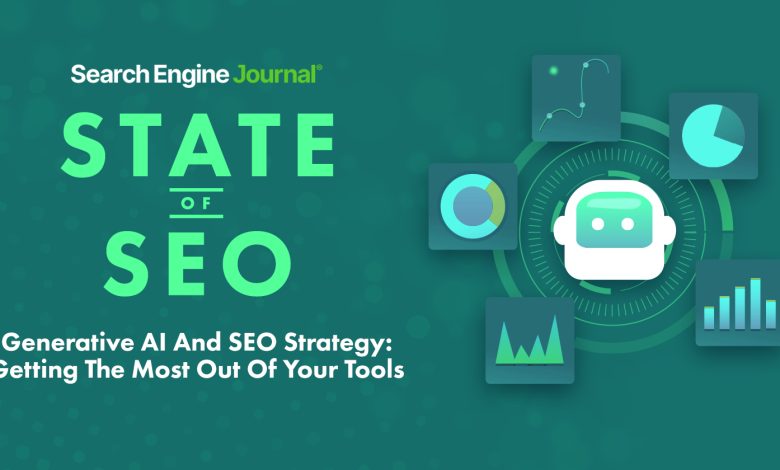
Our latest State Of SEO report offers insights into how SEO professionals are responding to the surge of generative AI tools that can create written content.
The report surveyed SEO experts to assess their perspectives on the impact of emerging generative AI technologies on their strategies now and in the future.
While opinions vary on the potential effects, the survey revealed that most SEO professionals believe generative AI will have some impact and also presents new opportunities.
The report examines attitudes based on experience levels and team sizes and explores which SEO tasks respondents are most interested in automating with AI.
Additionally, this article discusses possible risks and limitations regarding the over-reliance on generative AI tools for content creation.
We also predict how SEO strategies may need to evolve as AI-generated content becomes more common in the near future.
The Impact Of Generative AI On SEO Strategies
Opinions differ on how generative AI will impact search engine optimization (SEO).
Some see it as the end of SEO as it currently exists, while others believe it will transform the field.
According to our survey, 81.5% of SEO professionals report that generative AI has already affected their SEO strategies in some way.
The report shows that executives are most concerned about the impact, with 37% predicting significant effects.
In contrast, freelancers (23.5%) and business owners/operators (24%) are more confident that generative AI won’t require substantial changes to their SEO approach.
Attitudes Toward AI’s Potential Impact
The survey discovered a positive outlook on AI’s potential impact, with 72.4% of respondents expecting positive benefits.
SEO professionals with 5 to 10 years of experience were the most optimistic, with 77.3% having a favorable view of generative AI.
Conversely, industry experts with more than 20 years of experience were the most concerned, with 27.9% expressing worries and 13.2% believing it could be very harmful.
Automation & AI In SEO Practices
A significant percentage (68%) of SEO experts plan to implement automated processes using AI tools.
Larger SEO organizations show more interest in automation, with adoption increasing as the number of employees in SEO teams grows.
The tasks most respondents want to automate using AI include:
- Maximizing generative AI’s potential (13.3%).
- Content creation (11.1%).
- Content analysis (10.7%).
- Managing structured data (7.5%).
This suggests that generative AI could significantly enhance efficiency and allow teams to focus on critical tasks.
Opportunities For SEO Service Providers
The report identifies two main opportunities for SEO service providers:
- Embracing generative AI and AI tools.
- Combining automation with personalization.
Companies providing SEO tools and software could benefit from meeting these needs.
Priorities For Directors & Higher Management
Executives and senior managers have specific priorities for automating tasks.
Their top priorities include utilizing generative AI (13.6%), conducting content audits (8%), auditing SEO (8%), and managing schema and structured data (6.7%).
Content generation ranks as the fifth most important priority.
As executives and senior managers possess significant purchasing power, they are likely to drive adoption in these areas.
Automation Preferences Based On Team Size
Teams of varying sizes have different automation priorities.
Medium-sized teams (11-100 people) tend to have similar automation preferences, while small and large teams have distinct needs.
Small SEO teams with fewer than 10 people focus more on content audits and backlink analysis. In contrast, individual SEO practitioners prioritize generative AI and analytics higher.
Fewer than half of solo SEO respondents plan to start using generative AI within the next year.
The trend for businesses to adopt AI solutions may stem from limited resources or a desire to stand out.
Smaller companies could benefit from implementing AI to enhance operational effectiveness, allowing them to concentrate on long-term strategy and innovation.
Larger teams, on the other hand, show more enthusiasm for generative AI and are well-positioned to embrace new technology and address workflow challenges.
Risks, Limitations, & Ethical Considerations Of Generative AI In SEO
While generative AI offers great potential for enhancing SEO, there is a need for caution to avoid over-dependence on it.
Despite its promise, it is crucial to understand its risks, limitations, and ethical challenges thoroughly.
Rushing into generative AI without careful consideration could lead to problems later on.
The Limitations Of Generative AI
While generative AI has made significant progress, it still makes errors. It can produce content lacking coherence, context, or correctness.
AI can handle vast amounts of data but lacks human critical thinking. This means that although its content is SEO-friendly, it might not provide value to readers or align with your brand.
The Risks Of Over-Reliance
Relying heavily on AI could render online content less creative and unique.
Over-reliance might result in uniform-sounding websites, reducing the human touch. This could make content less engaging and lower audience interaction.
Additionally, generative AI could harm a brand’s authenticity if the content sounds robotic or formulaic rather than reflecting the brand’s unique personality.
Search engines continually update their algorithms to prioritize quality, original content and diminish low-quality or deceptive material.
Relying too much on AI for content creation could lead to penalties if such content is perceived as low-quality or misleading.
Charting The Future: How SEO Strategies May Evolve
As AI improves at generating content, SEO strategies must evolve.
Here are some forward-looking insights on potential changes in SEO strategies:
Balancing Automation & Personalization
As AI becomes more adept at content generation, it will take over more routine writing tasks.
However, involving humans in the content creation process remains vital.
AI can generate text, but people ensure it resonates with readers and accurately represents the brand.
SEO professionals must strike a balance between utilizing AI’s capabilities and maintaining a personal touch.
The Rise Of Voice Search & AI’s Role
The growing use of AI assistants like Google Bard and Bing Chat could increase the popularity of voice search.
Consequently, SEO strategies may need to adjust for a shift toward voice search.
AI tools that generate conversational text can optimize content for voice search by anticipating common questions and using natural language.
AI-Powered Predictive Analysis
Generative AI and machine learning models can analyze vast data to identify patterns and predict future trends and user behaviors.
SEO strategies will likely leverage more data-driven insights to enhance content optimization and improve rankings.
Hyper-Personalized Content
AI can create tailored content for users based on their online interests and behaviors.
As AI advances, search engines may evolve by delivering more personalized search results pages (SERPs).
This could enhance the user experience and maintain engagement, necessitating that SEO experts adapt content strategies to remain competitive.
In Conclusion
The State Of SEO report provides valuable insights into how SEO professionals perceive the impact of generative AI.
Executives prioritize using AI for content audits and structured data management, while small teams focus more on audits and backlink analysis.
As generative AI continues to develop, SEO strategies will likely incorporate more predictive analytics, personalized content, and voice search optimization.
Nevertheless, human oversight and creativity are crucial to producing high-quality content that resonates.
The future of SEO will require balancing AI capabilities with the personal touch of human expertise.
Featured Image: Paulo Bobita



